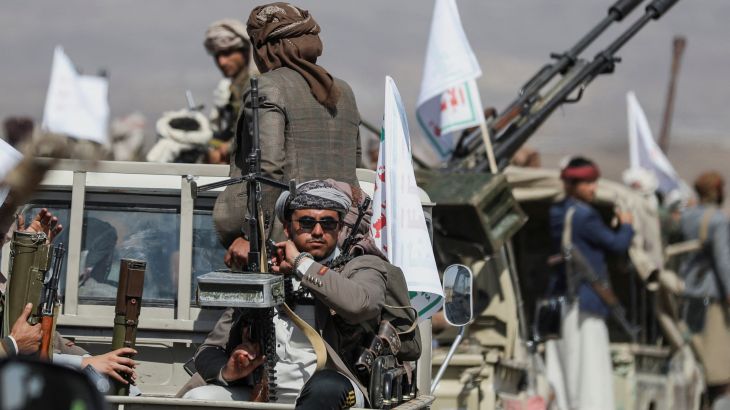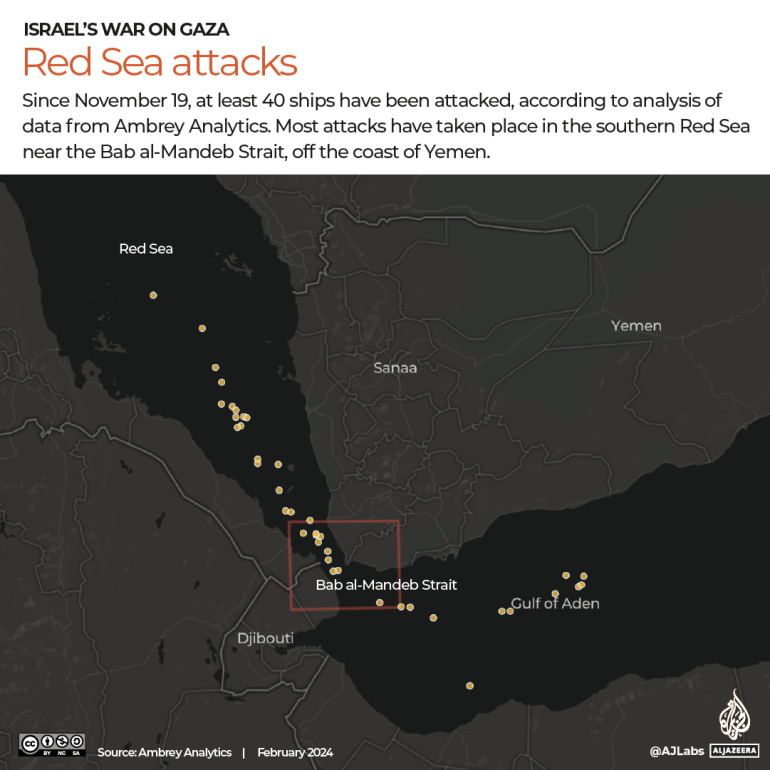UK-Houthi conflict stirs fears of escalation among Britain’s Yemenis
While some members of the community back the Houthis’ attempt to take on the West and Israel over Gaza, many also worry a wider conflict could unfold.

London, United Kingdom – When the United Kingdom and the United States launched joint attacks on Houthi targets in Yemen in January, British Prime Minister Rishi Sunak said it was intended as a “limited, single action”.
Yet since then, there have been several more rounds of strikes.
Keep reading
list of 4 items‘Hell for us’: Why Yemenis fear the US Houthi ‘terrorist’ designation
Houthis are recruiting record fighters. How will it affect Yemen?
US, UK bomb Houthi sites in Yemen amid surge in Red Sea ship attacks
With the Houthis pledging to continue their campaign to disrupt shipping in the Red Sea, it seems likely there will be more.
Britain is home to a small but significant Yemeni diaspora community of about 80,000 people.
The first Yemenis arrived in the northern city of Liverpool in the early 1900s – they were seamen and their families.
Today the city remains home to an estimated 11,000 Yemenis. For this community, rooted in Britain but still deeply connected to Yemen, recent events have been distressing.
“I was shocked and worried to hear about the strikes,” Ahmed Hamood, who runs a shop in Liverpool, told Al Jazeera by phone.
“The good thing is that for now it’s limited to military bases and not further into the cities, but there is a fear that it might spread. I have my extended family there so of course it’s a worry. Yemen has been through so much violence and conflict in recent years and it’s a tinderbox that could easily catch alight again.”
The crisis began in November after Israel began its onslaught on Gaza after the Hamas-led attack on October 7. The Houthis began launching missile and drone attacks at vessels in the Red Sea, most of which were intercepted by US and Israeli countermeasures.
The group said their campaign was a retaliation against Israel’s actions in Gaza, the enclave ruled by Hamas, and its backing from the West. Leader Abdul-Malik al-Houthi said his forces were “ready to move in the hundreds of thousands to join the Palestinian people and confront the enemy”.
Israel’s campaign in Gaza, which has killed nearly 30,000 Palestinians, came in retaliation for the Hamas-led assault in early October which killed 1,139 people. While Israel says it wants to crush the group considered by Western powers as a terrorist organisation, human rights groups, international bodies and several world leaders are alarmed by the high civilian death toll.
Analysts suggest that the Yemeni campaign has significantly boosted support for the Houthis domestically, given deep feelings about the Palestinian cause.
This is also reflected in the views of some in the diaspora.
“The majority of Yemenis are against the Houthis and their agenda within Yemen – they are dividing the country, and influenced by the Iranian regime,” said Najib al-Hakimi, a British Yemeni who runs a community organisation in Liverpool. “However, in this specific incident, many Yemenis agree with what the Houthis are doing. This is a retaliation for what’s going on in Gaza, an attempt to come to the aid of our brothers, the Palestinians.”
The Houthis are an Iran-aligned group which emerged in the 1980s in response to Saudi Arabia’s influence in Yemen. After the group overthrew the president in 2014, Yemen was consumed by a catastrophic civil war.
According to UN estimates, by the end of 2021, 377,000 people had been killed and four million displaced. A ceasefire in 2022 significantly reduced the violence, and fighting has not resumed despite the fact that the truce has officially expired.
“It is challenging for us, especially thinking of our families back home – every member of the Yemeni community in UK, they have friends and families still in Yemen,” said al-Hakimi. “But the strikes are very limited. It’s not the whole country. It’s only specific places. The feel of the community is Yemen is already destroyed anyway so limited strikes won’t make any difference.”
But some are worried that the civil war could resume.
The Houthis claim to have recruited tens of thousands of new fighters since beginning their actions in the Red Sea.
Some analysts fear that this surge in recruitment could change the balance of power in Yemen and prevent a lasting ceasefire in the civil war.
“The biggest concern for me is whether US-UK air strikes could somehow prompt the different sides of the civil war to take up arms again,” said Amina Ali, a British-Yemeni student based in Liverpool.
“The war lasted eight, nine years and it’s been less than two years since the ceasefire agreement. It’s close to the surface, and Yemen’s systems – healthcare, everything – are so fragile. I worry about that bigger impact, even though I am proud that despite all the problems we have in Yemen, my country is doing something to stand up for people in Gaza.”
Today, the Houthis run most of the west of the country, which includes the Red Sea coastline.
The Red Sea is one of the world’s most densely packed shipping channels, lying south of the Suez Canal, the most significant waterway connecting Europe to Asia and east Africa.
The cost of re-routing commercial ships has been significant, and there are concerns that continued disruption could start to have a serious effect on global trade.

Despite numerous rounds of US-UK air strikes, the Houthis show no signs of backing down: They recently announced they have “banned” vessels linked to Israel, the United States and the United Kingdom from sailing in surrounding seas.
“I don’t think it’s going to escalate, because the Americans and the British don’t want another war in Yemen or escalation to the wider region,” said al-Hakimi. “But at the same time, I don’t think the Houthis will stop unless the war in Gaza stops. And a lot of people think that is legitimate.”